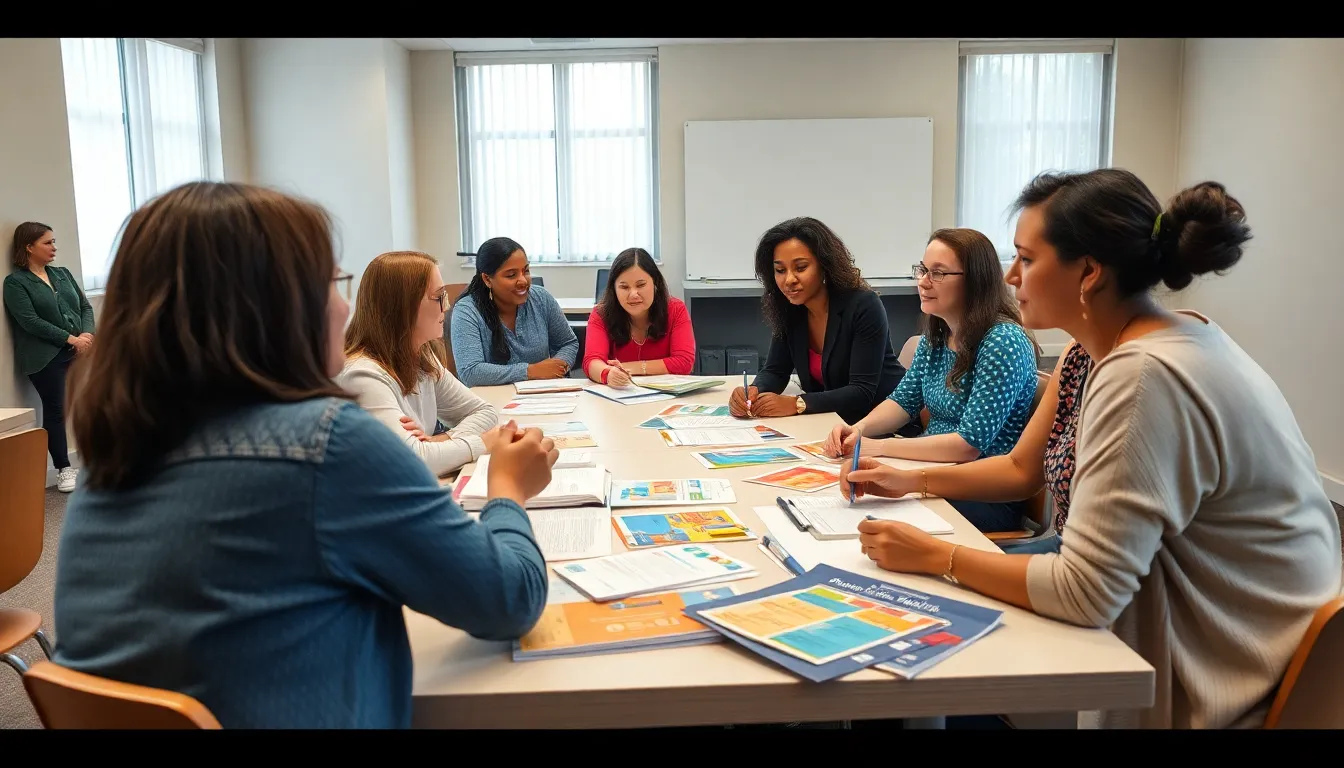In the bustling world of early childhood education, staying ahead is no child’s play. ECE professionals juggle lesson plans, tiny tantrums, and snack time negotiations like seasoned pros. But what happens when they need to level up their skills? Enter professional development—a magical realm where educators transform into superheroes armed with new strategies and insights.
Table of Contents
ToggleUnderstanding ECE Professional Development
ECE professional development offers vital opportunities for educators to refine their skills and adopt effective teaching strategies. This process enhances the quality of early childhood education and directly impacts student outcomes.
Definition and Importance
Professional development in ECE refers to ongoing training and education for early childhood educators. It’s essential for keeping educators informed about current best practices, research, and methodologies. Such development fosters a deeper understanding of child development and learning. Engaging in professional growth helps educators face challenges effectively, improving their confidence and competence. Research indicates that teachers who participate in consistent professional development see marked improvements in classroom effectiveness and student learning experiences.
Key Components of Effective ECE Professional Development
Effective ECE professional development includes several critical components. First, it must be relevant to the educators’ specific needs and classroom contexts. Next, opportunities for collaborative learning enhance knowledge sharing among peers. Additionally, ongoing support and feedback from mentors facilitate continuous improvement. Incorporating hands-on experiences allows educators to practice new concepts in real-time. Lastly, aligning professional development with early childhood standards strengthens instructional delivery, ensuring that educators provide quality education.
Methods of ECE Professional Development
Various methods exist for enhancing skills and knowledge in early childhood education. These methods cater to different learning preferences and schedules.
Workshops and Seminars
Workshops and seminars provide ECE professionals with valuable opportunities for in-person learning. Typically, these sessions focus on specific topics, allowing educators to dive deep into subjects like child psychology or curriculum development. Engaging with experienced speakers fosters discussion and networking among peers. Many workshops also incorporate hands-on activities, which help reinforce the concepts presented. Scheduling multiple sessions throughout the year can ensure ongoing skill enhancement and adaptation to new strategies.
Online Courses and Webinars
Online courses and webinars are convenient options for ECE professionals seeking flexibility in their training. With a wide range of topics available, educators can choose courses that fit their specific needs and interests. The self-paced nature of many online courses allows participants to learn at their own speed. Webinars often feature real-time interaction, enabling questions and discussions with experts. Accessing recorded webinars provides opportunities for review, ensuring the retention of important information.
Peer Mentoring and Coaching
Peer mentoring and coaching facilitate collaborative professional growth among ECE professionals. These relationships offer personalized feedback and support, which is crucial for skill development. Engaging in regular check-ins and goal-setting discussions fosters accountability and encourages continuous improvement. Sharing experiences and challenges with colleagues generates a sense of community and provides unique insights into different teaching approaches. Overall, this method enhances teaching practices and boosts confidence in early childhood educators.
Impact on Early Childhood Education
ECE professional development significantly enhances the quality of early childhood education. Educators equipped with updated knowledge and skills create richer learning environments for children.
Enhancing Teaching Practices
Ongoing training allows ECE professionals to refine their teaching methods. Techniques learned through professional development lead to more engaging lesson plans. Classroom management improves as educators become adept at addressing children’s emotional needs. Collaboration with peers during workshops fosters idea-sharing and innovation. Practical experience gained from hands-on training workshops empowers educators to implement new strategies successfully.
Improving Child Outcomes
Children benefit directly from the enhanced skills of their educators. Research indicates that classrooms led by well-trained teachers show improved learning outcomes. Increased educator confidence translates into more effective instruction. Developmentally appropriate practices promote better social and emotional growth among children. Ultimately, children experience a nurturing environment that fosters their overall development and prepares them for future academic success.
Challenges in ECE Professional Development
ECE professionals face several challenges in pursuing ongoing development. Barriers such as time constraints and limited access to resources hinder their ability to engage in essential training opportunities.
Barriers to Access
Barriers significantly impact ECE professional development. Geographic location often limits access to quality workshops and seminars. Financial constraints also play a role, as many educators may not receive funding for training. Additionally, time limitations decrease opportunities for participation. Educators juggling multiple responsibilities find it difficult to carve out time for professional growth. Institutions can address these barriers by providing virtual options, which enhance accessibility and convenience for all ECE professionals.
Addressing Diverse Needs
Addressing the diverse needs of ECE professionals requires thoughtful strategies. Individual learning preferences vary, necessitating a one-size-fits-all approach. Offering a combination of in-person and online training caters to various styles and schedules. Facilitating peer mentoring helps share knowledge relevant to specific challenges faced by educators. Supportive environments foster collaboration among professionals, allowing them to learn from each other. Continuous evaluation of professional development programs ensures they remain effective and aligned with the unique requirements of early childhood education.
Future Trends in ECE Professional Development
Emerging trends in early childhood education professional development focus on technology and lifelong learning strategies. These trends enhance educators’ effectiveness and adapt to evolving educational landscapes.
Technology Integration
Integrating technology into professional development reshapes how educators access training and resources. Online platforms deliver courses and webinars, catering to diverse schedules and learning preferences. Virtual reality simulations allow for immersive learning experiences, enabling educators to practice classroom strategies. Mobile applications provide on-the-go resources, encouraging continuous learning. Incorporating data analytics can personalize learning paths, optimizing individual growth and development.
Lifelong Learning Approaches
Adopting lifelong learning approaches ensures educators stay updated in their field. Continuous opportunities for professional growth create a culture of reflection and improvement. Workshops and forums focused on current ECE trends foster collaboration and idea exchange. Micro-credentials recognize specific skills, motivating educators to pursue targeted growth. Mentorship programs support ongoing development by pairing experienced educators with those seeking guidance. Prioritizing these approaches ultimately enriches both educators and the children they serve.
Conclusion
Investing in ECE professional development is vital for enhancing the quality of early childhood education. By prioritizing ongoing training and support, educators can refine their skills and adapt to the evolving needs of their students. This commitment not only fosters personal growth but also leads to improved learning outcomes for children.
As ECE professionals embrace new strategies and methodologies, they create more engaging and effective learning environments. The integration of technology and collaborative learning opportunities further enriches their development journey. By addressing the unique challenges faced by educators and providing tailored resources, the field of early childhood education can continue to thrive, ensuring a brighter future for both educators and the children they nurture.





